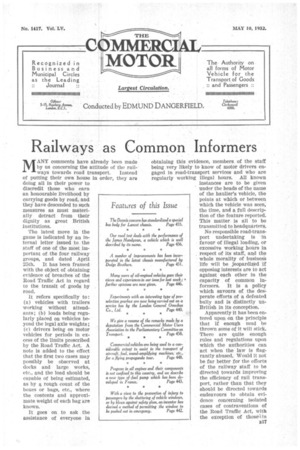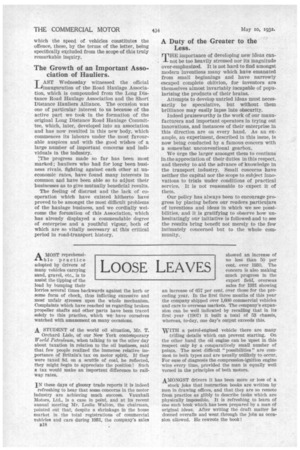Railways as Common Informers
Page 31

Page 32

If you've noticed an error in this article please click here to report it so we can fix it.
MANY comments have already been made by us concerning the attitude of the rail ways towards road transport. Instead of putting their 01891 house in order, they are doing all in their power to discredit those who earn an honourable livelihood by carrying goods by road, and they have descended to such measures as must materially detract from their dignity as great British institutions.
The latest move in the game is indicated by an internal letter issued to the staff of one of the most important of the four railway groups, and dated April. 25th. It has been framed with the object of obtaining evidence of breaches of the Road Traffic Act in regard to the transit of goods by road.
It refers specifically to : (a) vehicles with trailers working without attendants; (b) loads being regularly placed on vehicles beyond the legal axle weights ; (c) drivers being on motor vehicles for periods in excess of the limits prescribed by the Road Traffic Act. A note is added to the effect that the first two cases may possibly, be observed at docks and large works, etc., and the load should be capable of being estimated, as by a rough count of the boxes or bags, etc., where the contents and approximate weight of each bag are known.
It goes on to ask the assistance of everyone in obtaining this evidence, members of the staff being very likely to know of motor drivers engaged in road-transport services and who are regularly working illegal hours. All known instances are to be given under the heads of the name of the haulier's vehicle, the points at which or between which the vehicle was seen; the time, and a full description of the feature reported. This matter is all to be transmitted to headquarters.
No responsible road-transport undertaking is in favour of illegal loading, or excessive working hours in respect of its staff, and the whole morality of business life will be jeopardized if opposing interests are to act against each other in the capacity of common informers. It is a policy which savours of the desperate efforts of a defeated bully and is distinctly unBritish in its conception.
Apparently it has been entered upon on the principle that if enough mud be thrown some of it will stick. There are quite enough rules and regulations upon which the authorities can act when the law is flagrantly abused. Would it not be far better for the efforts of the railway staff to be directed towards improving the efficiency of rail transport, rather than that they should be directed towards endeavours to obtain evidence concerning isolated cases of contraventions of the Road Traffic Act, with the exception of thosIn which the speed of vehicles constitutes the offence, these, by the terms of the letter, being specifically excluded from the scope of this truly remarkable inquiry.
The Growth of an Important Association of Hauliers.
TIA.AST Wednesday witnessed the official inauguration of the Road Haulage Association, which is compounded from the Long Distance Road Haulage Association and the Short Distance Hauliers Alliance. The occasion was one of particular interest to us because of the active part we took in the formation of the original Long Distance Road Haulage Committee, which, later, developed into an association and has now resulted in this new body, which commences its labours under the most favourable auspices and with the good wishes of a large number of important concerns and individuals in the industry.
The progress made so far has been most marked ; hauliers who had for long been business rivals, fighting against each other at uneconomic rates, have found many interests in common a.nd have been able so to adjust their businesses as to give mutually beneficial results.
The feeling of distrust and the lack of cooperation which have existed hitherto have proved to be amongst the most difficult problems of the haulage business, and we cordially welcome the formation of this Association, which has already displayed a commendable degree of enterprise and a youthful vigour, both of which are so vitally necessary at this critical period in road-transport history.
A Duty of the Greater to the Less.
THE importance of developing new ideas cannot be too heavily stressed nor its magnitude over-emphasized. It is not hard to find amongst modern inventions many which haVe emanated from small beginnings and have narrowly escaped complete oblivion, for inventors are themselves almost invariably incapable of popularizing the products of their brains.
Attempts to develop untried ideas must necessarily be speculative, but without them brilliance may easily lapse into obscurity.
Indeed praiseworthy is the work of our manufacturers and important operators in trying out innovations, and instances of their enterprise in this direction are on every hand. As an example, an experiment, described in this issue, is now being conducted by a famous concern with a somewhat unconventional gearbox.
We urge the larger amongst them to continue In the appreciation of their duties in this respect, and thereby to aid the advance of knowledge in the transport industry. Small concerns have neither the capital nor the scope to subject innovations to trials under conditions of practical service. It is not reasonable to expect it of them.
Our policy has always been to encourage progress by placing before our readers particulars of inventions and ideas in which we see possibilities, and it is gratifying to observe how unhesitatingly our initiative is followed and to see the results bring benefit not merely to the few Intimately concerned but to the whole community.,




























































































